| dc.contributor.author | Solomon, Dawit | |
| dc.contributor.author | Lehmann, Johannes | |
| dc.contributor.author | Fraser, James A. | |
| dc.contributor.author | Leach, Melissa | |
| dc.contributor.author | Amanor, Kojo | |
| dc.contributor.author | Frausin, Victoria | |
| dc.contributor.author | Kristiansen, Søren M. | |
| dc.contributor.author | Millimouno, Dominique | |
| dc.contributor.author | Fairhead, James | |
| dc.coverage.spatial | West Africa | en |
| dc.date.accessioned | 2016-03-02T10:15:57Z | |
| dc.date.available | 2016-03-02T10:15:57Z | |
| dc.date.issued | 2016-03 | |
| dc.identifier.citation | Solomon, D. et al., (2016) Indigenous African soil enrichment as a climate-smart sustainable agriculture alternative. Frontiers in Ecology and the Environment, vol. 14, no. 2, pp. 71-76. Washington, D.C.: Ecological Society of America. | en |
| dc.identifier.issn | 1540-9295 | |
| dc.identifier.uri | https://opendocs.ids.ac.uk/opendocs/handle/20.500.12413/9671 | |
| dc.description | Copyright by the Ecological Society of America | en |
| dc.description.abstract | We describe for the first time a current indigenous soil management system in West Africa, in which targeted
waste deposition transforms highly weathered, nutrient- and carbon- poor tropical soils into enduringly
fertile, carbon- rich black soils, hereafter “African Dark Earths” (Af DE ). In comparisons between Af DE and
adjacent soils ( AS ), Af DE store 200–300% more organic carbon and contain 2–26 times greater pyrogenic carbon
(PyC). PyC persists much longer in soil as compared with other types of organic carbon, making it
important for long- term carbon storage and soil fertility. In contrast with the nutrient- poor and strongly
acidic ( pH 4.3–5.3) AS , Af DE exhibit slightly acidic ( pH 5.6–6.4) conditions ideal for plant growth, 1.4–3.6
times greater cation exchange capacity, and 1.3–2.2 and 5–270 times more plant- available nitrogen and phosphorus,
respectively. Anthropological investigations reveal that Af DE make a disproportionately large contribution
(24%) to total farm household income despite its limited spatial extent. Radiocarbon ( 14 C) aging of
PyC indicates the recent development of these soils (115–692 years before present). Af DE provide a model for
improving the fertility of highly degraded soils in an environmentally and socially appropriate way, in
resource- poor and food- insecure regions of the world. The method is also “climate- smart”, as these soils
sequester carbon and enhance the climate- change mitigation potential of carbon- poor tropical soils. | en |
| dc.language.iso | en | en |
| dc.publisher | Ecological Society of America | en |
| dc.rights.uri | http://www.ids.ac.uk/files/dmfile/IDSOpenDocsStandardTermsOfUse.pdf | en |
| dc.subject | Agriculture | en |
| dc.subject | Environment | en |
| dc.subject | Climate Change | en |
| dc.title | Indigenous African soil enrichment as a climate-smart sustainable agriculture alternative | en |
| dc.type | Article | en |
| dc.rights.holder | Ecological Society of America | en |
| dc.identifier.externaluri | http://dx.doi.org/10.1002/fee.1226 | en |
| dc.identifier.doi | 10.1002/fee.1226 | |

